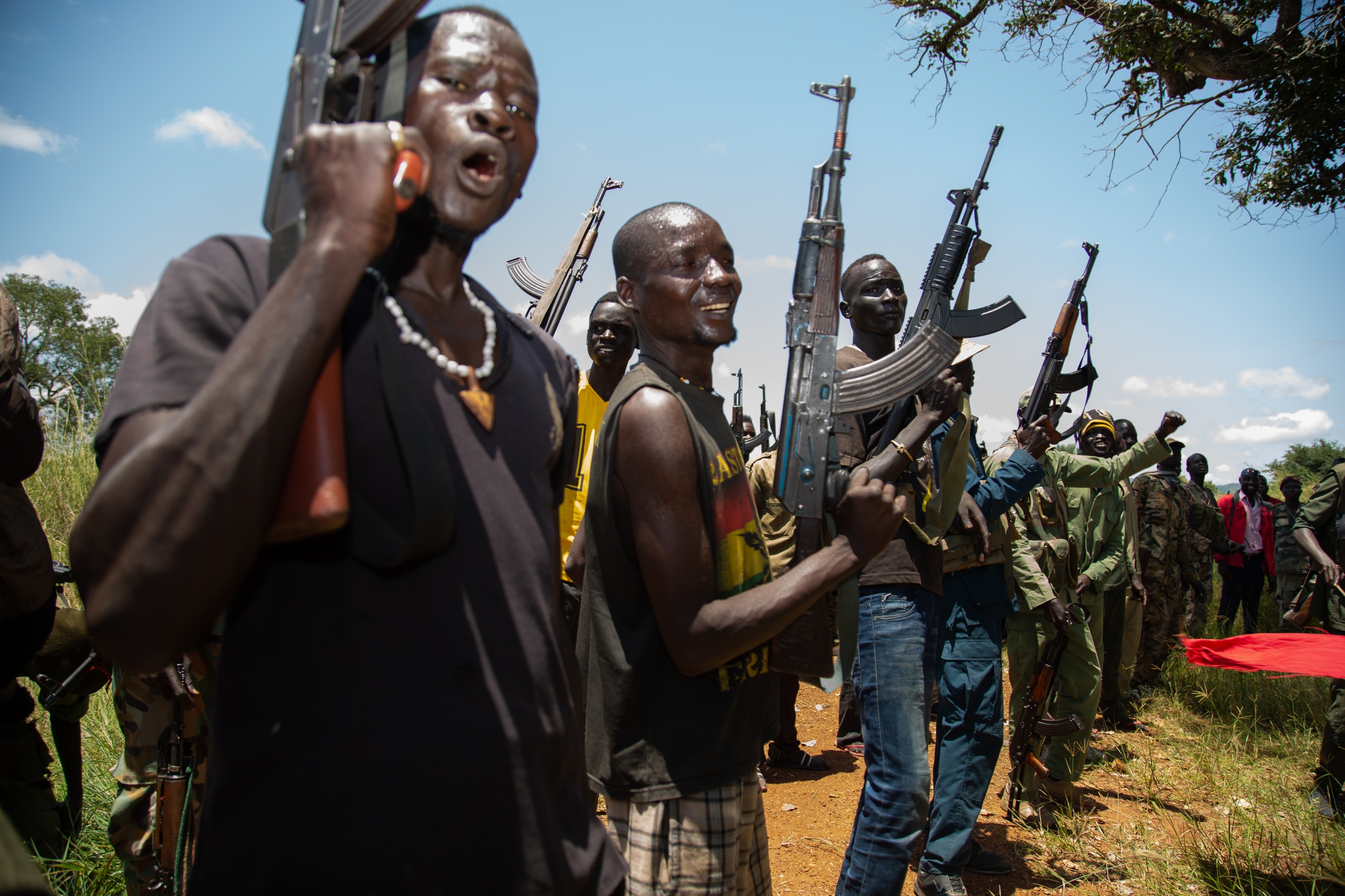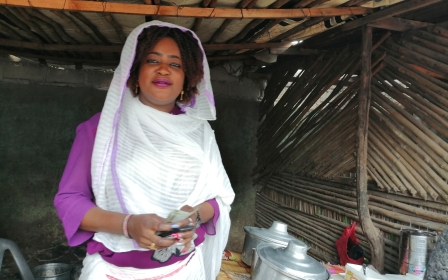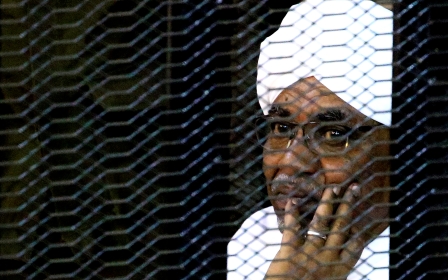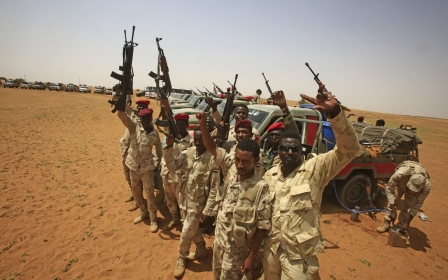South Kordofan rebels' call for secularism challenges Sudan's Islamists

A Sudanese armed group that waged a deadly insurgency for several years has called on the country's newly created sovereign council to abandon Islamism and embrace secular rule.
Aljak Mahmoud, the spokesman for the Sudan People's Liberation Movement-North (SPLM-N), told Middle East Eye that Sudan's transitional government needed to make substantive changes to the country's constitution, or risk facing calls for secession in the largely Christian south.
The SPLM-N, which has been fighting the government of Sudan since 2011, has long demanded secular rule or self-determination in the predominantly Christian area of South Kordofan which borders South Sudan.
'Sudan is witnessing a big change as thousands from a new class - women and youths - embrace the ideology of liberalism that is colliding with the conservative community'
- Alhadi Alamin, political analyst
The group has since last month been attending peace talks in Juba, South Sudan's capital, which are aimed at ending the country's years-long conflict.
A third round of talks is expected to be held on 21 November.
New MEE newsletter: Jerusalem Dispatch
Sign up to get the latest insights and analysis on Israel-Palestine, alongside Turkey Unpacked and other MEE newsletters
"We agreed on the agenda of the talks but [are] stuck on the issue of religion and secularism," Mahmoud said.
The SPLM-N has frequently clashed with the Sudanese military since South Sudan gained independence from Sudan in 2011.
South Sudan has been gripped by its own civil war in which hundreds of thousands of people are believed to have died.
Who are Sudan's rebel groups?
+ Show - HideSRF: Sudanese Revolutionary Front
Rebel groups fighting in Darfur, Blue Nile State and South Kordofan formed the SRF in 2011 to unite efforts in talks with the government and have advocated for greater representation for minorities and marginalised communities during Sudan's post-Bashir transition
SPLM: Sudan People's Liberation Movement
Founded by the iconic rebel leader John Garang, who aimed for a democratic Sudan, the SPLM fought a war against the Sudanese state that eventually led to the secession of South Sudan in 2011. It is now South Sudan's ruling party, led by President Salva Kiir.
SPLM/N: Sudan People's Liberation Movement - North (Agar faction)
Garang's allies formed a northern branch of the SPLM after South Sudan's independence to focus on establishing the SPLM's vision of equality in Sudan. In 2011, SPLM-N chairman Malik Agar was removed by Bashir from his elected position as governor Blue Nile state and launched a rebellion that saw him take control of part of the region.
SPLM/N (Alhilu faction)
The group's vice-chair Abdel Aziz Alhilu splintered to create a faction focused on the grievances of South Kordofan, which borders South Sudan, and has become the most influential Sudanese rebel faction, fighting from the Nuba mountains and controlling large amounts of territory.
SLA/AW: Sudan Liberation Army - Abdul Wahid faction
In 2001 leaders from different indigenous Darfuri communities formed the Sudan Liberation Army to fight Bashir's government, claiming they represented Sudan's marginalised communities. The government was accused of carrying out genocide in its response, which used militias known as the Janjaweed to attack Darfuri communities.
Ethnic Fur, Khartoum-educated lawyer Abdul Wahid was the original chairman and now leads his own faction after the group splintered. Since 2016, Sudanese forces have been trying to clear SLA-AW fighters from the Jebel Marra area of Darfur.
SLA/MM: Sudan Liberation Army - Minni Minnawi faction
SLA commander Minni Minnawi, from the Zaghawa herder community, split from Abdul Wahid and formed his own faction. They have had very little presence in Darfur in recent years, basing themselves in neighbouring Libya.
JEM: Justice and Equality Movement
Founded based on grievances about inequality of power in Sudan and with more religious affiliation than other rebel groups, including leaders who were former members of the Islamist movement, JEM eventually became the most powerful Darfuri group. In 2008 it attempted to overthrow the government by storming Khartoum, only halted when they clashed with Sudanese forces in the capital's sister city Omdurman.
The new peace initiative comes after the removal of long-time president Omar al-Bashir, who was toppled from power by the Sudanese military in April in the wake of months-long mass protests against his 30-year rule.
Under Bashir's military regime, Sudan claimed to have laws which took the Sharia, or Islamic law, as their main source of governance.
Floggings were a common punishment for crimes like drinking alcohol, while amputations were carried out for thefts and robberies.
Although sentences of stoning were rare, in 2012 a young teenage mother was sentenced to death by stoning for adultery, sparking condemnation from human rights groups and activists.
One hundred percent Islamic?
After uprisings swept through the region in early 2011, toppling Hosni Mubarak in neighbouring Egypt, Bashir cemented Islamist ideology into his military government, despite opposition in the country's south.
The former president went as far as to promise that Sudan's constitution would be "100 percent Islamic", in an effort to placate some of the country's most hardline groups.
But since his removal from power earlier this year, an 11-member sovereign council, made up from the military and a coalition of opposition forces for a three-year transitional period, has rolled back the role Islam plays in everyday life.
Mohamed Alfaki Suleiman, a 40-year-old journalist and member of the sovereign council, said that the authorities had significantly curbed the role of Islam in political life and were planning on going further.
"If you look carefully … [in] the constitutional declaration [of] the current transitional period, there is no indication to the adoption of an Islamic system," Suleiman told MEE.
"Also, the Ministry of Justice is working on the process of amendments to laws that restricted [the] freedoms of the people and came from a wrong interpretation of Islamic laws… such as public order laws."
However, Suleiman added that that the transitional government could not issue directives on self-determination for any part of the country, a major demand of the SPLM-N.
"Such issues can only be discussed at the constitutional conference which is supposed to be held at the end of the three-year transitional period," he said.
Diminishing role of political Islam
Since the sovereign council issued their constitutional declaration in August, Islamic groups believed to be close to Bashir's former government have been highly critical of political Islam's diminishing role, often staging rallies or issuing statements denouncing the new government.
A Salafist group, led by the popular cleric Abdul Hai Youssef, has held demonstrations in the capital Khartoum under the banner: "Strengthening the Sharia," while also declaring officials in the transitional government as apostates.
Wala Alboushi, a minister of youth and sports and one of those accused over the commencement of the first league of Women Football in Sudan, has opened a legal case against Youssef; but anger against the apparent rolling back of political Islam appears to be mounting.
Mohamed Ali Algizouli, a prominent Muslim cleric, has also slammed the constitutional declaration as "non-Islamic," warning that it could lead to serious reactions and consequences among Sudan’s Islamic community.
"This constitution has been made by a minority group of secularists that didn't consult the people," he said.
"This hijacking of the will of the people will lead to serious consequences."
Alhadi Alamin, a Sudanese political analyst, has said that "radical Islamic groups" and individuals from the "circle of the old regime" were trying to exploit unrest in the transitory period to “counter” the revolution.
"Sudan is witnessing a big change as thousands from a new class - women and youths - embrace the ideology of liberalism that is colliding with the conservative community," he said.
"The problem is that the radical Islamic groups and the circle of the old regime will exploit this to counter the revolution.
"This tension is expected and will lead to more polarisation and more confrontations."
This article is available in French on Middle East Eye French edition.
Middle East Eye delivers independent and unrivalled coverage and analysis of the Middle East, North Africa and beyond. To learn more about republishing this content and the associated fees, please fill out this form. More about MEE can be found here.






